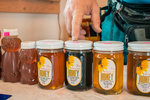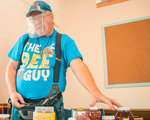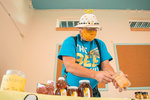


Editor’s Note: The Chronicle is working to assist local businesses suffering from the effects of the COVID-19 virus spread and associated government orders to close or limit commerce. There will be a feature on a local business in each edition of The Chronicle and at chronline.com moving forward. To be considered, email reporter Eric Trent at etrent@chronline.com. Additionally, The Chronicle will continue to offer its coverage of the coronavirus and its effects across the community, state and nation free outside of our paywall at chronline.com.
ETHEL — Rob Jenkins got his start as an apiarist when his neighbor had a swarm of bees in an apple tree. Jenkins went over and helped the neighbor, who was a new beekeeper at the time, place the swarm in a box. Neither of them had a bee suit on and, surprisingly, neither was stung.
“My interest grew from there,” Jenkins said.
Jenkins didn’t know it at the time, but bees are actually most docile when they are in a swarm, when a colony branches off from its main hive to go find a new home. During springtime, the food supply is plentiful and the queen begins ramping up her egg production, which increases the population. The hive becomes overcrowded and the queen, along with about 60 percent of the colony takes off in search of a new home. That’s what’s happening when a person sees a football-sized swarm of bees on, say, a limb of a tree.
“They are the mellowest you’ll ever see them,” Jenkins said. “You can handle them pretty well without stings, at that point.”
Now Jenkins performs swarm captures, structural removal of nests and sells honey as a full-time job.
Jenkins, a former welder who built bomb disposal trailers, began learning from Jason and Heather Sherwood, former local beekeepers who had to give it up after Jason developed an allergy to bees.
“They were one of, if not, the best thing to happen to Lewis County, as far as beekeeping,” Jenkins said.
He coupled their tutoring with his own research and trial and error over the years to evolve his own methods. Jenkins catches bees, places them in a wooden beehive and transports them to his apiaries, or beeyard, in Ethel. Catching them can be done in a variety of ways, including shaking them into the wooden hive, sweeping them with a hand, picking them up by the handful or using a Bee Vac, which is Jenkins preferred method.
He has a custom-built Bee Vac made out of a cordless, Ryobi pool vacuum. It’s low-powered and modified with a 32-foot, smooth-bore hose that’s safer than the standard typical rippled-hose used on shop vacs, which tumble the bees and destroy them.
“It’s very gentle to the bees,” Jenkins said.
For structural removal, which is typically on the side of a house, garage or shed, Jenkins determines where the bees are at and cuts open the siding. He then measures, cuts and places the honeycomb into the wooden beehive, along with the bees, and transports the entire colony back to his beeyard.
Jenkins is able to save between 95 and 100 percent of a colony. He performs removals at night with his Bee Vac and red lights, which keeps the bees calm compared to a regular light.
The number of removals each year varies. This year he’s only performed two but has done up to 26 in a single year. It’s about the end of the season for removals right now, as Jenkins doesn’t do any after mid-June. After that, the bees don’t have enough time to build their resources before winter.
“We try to be careful when we remove them and put them in a hive, but even at that it’s a rather destructive process,” Jenkins said. “They need time to recover and rebuild, and just in case we didn’t get the queen they need time to build a new queen.”
Jenkins performs bee removals for free. What he gets out of it are the bees and honey, which he uses to keep his bee yard stocked up. However, only honey bees produce honeycombs.
The other common bees in Washington state are bumblebees and mason bees, and all three are important to the ecosystem. They all pollinate plants and each has their own specialty. Honey bees can’t pollinate tomato plants, while bumblebees can, and mason bees fly in cool, wet weather and pollinate apple trees. One mason bee can pollinate an apple tree at the same rate as 6,000 to 10,000 honeybees, Jenkins said, and it only takes two mason bees to pollinate an entire apple tree.
“There’s a lot of places where the three overlap in their importance,” Jenkins said.
Jenkins currently has six or seven active beehives at his place and is in rebuild-mode after losing all his colonies over the winter to mites, which can wipe out entire colonies. It’s the result of him not using chemicals in his hives that would ward off mites. But Jenkins doesn’t want to use chemicals because of his honey-selling business.
Jenkins sells several varieties of raw, unfiltered honey, which are all natural, based on what the bees were feeding on when they made the honey. No flavors are added.
“If it has been pasteurized and filtered, in my opinion, it is not honey and I will not sell it,” Jenkins said.
He currently has fireweed, thistle, buckwheat, raspberry, blueberry, blackberry and clover. The fireweed and thistle are $12 for a one-pound jar and the others are $10 per jar. Quartz of blackberry or wildflower run for $22.
He also sells beeswax and bee pollen, and makes his own lip balms and lotions out of beeswax and coconut oil.
Jenkins and his products can be found at the Thursday Toledo Market from 2 p.m. to 6 p.m.; the Centralia Farmers Market from 11 a.m. to 5 p.m. on Fridays; at the corner of Jackson Highway and State Route 508 on Saturdays; and at the Castle Rock Farmers Market from 1 p.m. to 5 p.m. on Sundays.
More Information on Bee Wrangler Honey
Owner: Rob Jenkins
Location: Ethel
Phone: 360-219-3092
Hours: By appointment
Top-selling items at Bee Wrangler Honey
Fireweed honey: $12 per pound
Thistle honey: $12 per pound
Raspberry honey: $10 per pound
Blackberry honey: $10 per pound
Blueberry honey: $10 per pound
•••
Reporter Eric Trent can be reached at etrent@chronline.com. Visit chronline.com/business for more coverage of local businesses.